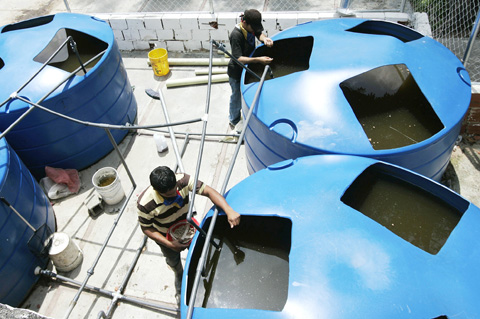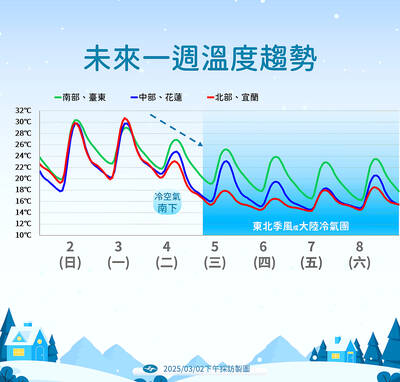While Venezuelan President Hugo Chavez struggles to revive the battered bolivar, in a hillside slum overlooking his palace, die hard supporters are talking about getting rid of the Venezuelan currency altogether.
Welcome to the 23 de Enero barrio, home to about 100,000 people and something of a laboratory for Chavez’s nationwide socialist experiment. Here you find dogs named “Comrade Mao,” and even a “revolutionary car wash.”

PHOTO: REUTERS
“We are creating a popular bank and are going to issue a communal currency: little pieces of cardboard,” says Salvador Rooselt, a soft-spoken 24-year-old law student and community leader who often quotes Lenin and Marx.
Some 20 militant groups sometimes described as Chavez’s “storm troopers” run this urban jungle in western Caracas, where hulking concrete buildings daubed with colorful murals -— one depicting Jesus Christ brandishing an AK-47 rifle — show off the neighborhood’s radical tradition.
“We are giving capitalism a punch in its social metabolism,” said Rooselt, of the Alexis Vive group, wearing its trademark bandana with the image of guerrilla icon Ernesto Che Guevara around his neck.
A deeply rooted socialist ideology, absolute territorial control and financing from the government have allowed Alexis Vive to put into practice some of the ideas Chavez is struggling to implement in the rest of Venezuela.
Socialist stores sell milk and meat from recently nationalized producers at about a 50 percent discount. Residents do voluntary work, kids are encouraged to steer clear of drugs and some youths have even joined a pioneer organization modeled on similar groups in communist Cuba.
“I’m sure President Chavez supports our initiatives and seeks to implement them at a national level,” Rooselt said.
Alexis Vive spreads its message via Radio Arsenal, an underground FM station Rooselt says was inspired by Vladimir Lenin’s experience with a political newspaper a century ago.
They are also turning their hands to urban agriculture and fish farming to feed locals, and say that the future communal bank will extend micro-credit to foster economic independence.
Despite being a stronghold of the “chavista” movement with a massive electoral muscle that has helped the president win votes for more than a decade, 23 de Enero’s radicalism has often proved a political liability for Venezuela’s leader.
A series of attacks targeting opposition symbols such as the Globovision television station, and even the Roman Catholic Archdiocese, have led Chavez to publicly distance himself from these groups in the past — although some neighbors think they still take direct orders from “Comandante Presidente.”
George Ciccariello-Maher, a social scientist with a PhD from the University of California, Berkeley, who has studied Venezuela’s radical movements, calls it a “tense alliance” between the president and the barrios.
“Chavez depends on the radical sectors for support, but neither side truly trusts one another ... If he were to destroy them, he would be destroying his own base as well,” he said.
Gone are the days when local groups proudly displayed their automatic weapons in front of visiting reporters. Militants from Alexis Vive say their armed struggle is over.
“Ever since the revolutionary process started there haven’t been any weapons. We joined the Bolivarian militias,” said Rooselt, referring to a 35,000-strong armed force recently launched by Chavez to defend his socialist revolution.
But other more belligerent groups within 23 de Enero appear to be still armed to the teeth.
In January, one of the groups released a video to the media showing its members dressed in military attire and brandishing automatic weapons and a rocket-propelled grenade launcher.
They called on Chavez to clean his government of corrupt “false socialists.”
Security in 23 de Enero remains tight. Rooselt said he received a call by cellphone the moment two reporters were spotted in the neighborhood.
That might explain why crime rates here have dropped by 95 percent, according to the militants, who say they have turned it into one of the safest places in crime-ridden Caracas.
Known in the past as “Little Vietnam,” 23 de Enero has a long history of left-wing radicalism. The neighborhood’s name refers to January 23, 1958, the date on which military dictator Marcos Perez Jimenez was toppled.
The community, mostly made up of rural workers attracted to the capital by Venezuela’s oil boom, played a key role in the 1989 riots known as the “Caracazo,” which claimed scores of lives when the army shelled buildings in the area for days.
Alexis Vive, for instance, honors community leader Alexis Gonzalez, who was killed by the police in 2002.
Berkeley’s Ciccariello-Maher calls 23 de Enero an example of “alternative sovereignty” beyond the control of the state.
“The neighborhood and movements it nurtures represent both the laboratory and spearhead of the Bolivarian Revolution ... It is in 23 de Enero that the most radical forces are located, forces which drive the process forward,” he said.
The government is finding new ways of supporting 23 de Enero. In a plot behind a local market, neighbors in Che Guevara bandanas are building a state-funded brick factory equipped with Iranian technology.
Not far from there, a group of former paratroopers who joined a failed coup d’etat by Chavez in 1992 have set up a “revolutionary car wash” next to a wall displaying a huge picture of the late Colombian guerrilla commander Marulanda.
“Here in 23 de Enero we are committed to take this process to the very end,” said cooperative member Martin Campos, a 38-year-old retired soldier sporting a yellow baseball cap with a red star. “We are chavistas. Red, very red.”

SECURITY: The purpose for giving Hong Kong and Macau residents more lenient paths to permanent residency no longer applies due to China’s policies, a source said The government is considering removing an optional path to citizenship for residents from Hong Kong and Macau, and lengthening the terms for permanent residence eligibility, a source said yesterday. In a bid to prevent the Chinese Communist Party (CCP) from infiltrating Taiwan through immigration from Hong Kong and Macau, the government could amend immigration laws for residents of the territories who currently receive preferential treatment, an official familiar with the matter speaking on condition of anonymity said. The move was part of “national security-related legislative reform,” they added. Under the amendments, arrivals from the Chinese territories would have to reside in Taiwan for

CRITICAL MOVE: TSMC’s plan to invest another US$100 billion in US chipmaking would boost Taiwan’s competitive edge in the global market, the premier said The government would ensure that the most advanced chipmaking technology stays in Taiwan while assisting Taiwan Semiconductor Manufacturing Co (TSMC, 台積電) in investing overseas, the Presidential Office said yesterday. The statement follows a joint announcement by the world’s largest contract chipmaker and US President Donald Trump on Monday that TSMC would invest an additional US$100 billion over the next four years to expand its semiconductor manufacturing operations in the US, which would include construction of three new chip fabrication plants, two advanced packaging facilities, and a research and development center. The government knew about the deal in advance and would assist, Presidential

‘DANGEROUS GAME’: Legislative Yuan budget cuts have already become a point of discussion for Democrats and Republicans in Washington, Elbridge Colby said Taiwan’s fall to China “would be a disaster for American interests” and Taipei must raise defense spending to deter Beijing, US President Donald Trump’s pick to lead Pentagon policy, Elbridge Colby, said on Tuesday during his US Senate confirmation hearing. The nominee for US undersecretary of defense for policy told the Armed Services Committee that Washington needs to motivate Taiwan to avoid a conflict with China and that he is “profoundly disturbed” about its perceived reluctance to raise defense spending closer to 10 percent of GDP. Colby, a China hawk who also served in the Pentagon in Trump’s first team,

The arrival of a cold front tomorrow could plunge temperatures into the mid-teens, the Central Weather Administration (CWA) said. Temperatures yesterday rose to 28°C to 30°C in northern and eastern Taiwan, and 32°C to 33°C in central and southern Taiwan, CWA data showed. Similar but mostly cloudy weather is expected today, the CWA said. However, the arrival of a cold air mass tomorrow would cause a rapid drop in temperatures to 15°C cooler than the previous day’s highs. The cold front, which is expected to last through the weekend, would bring steady rainfall tomorrow, along with multiple waves of showers